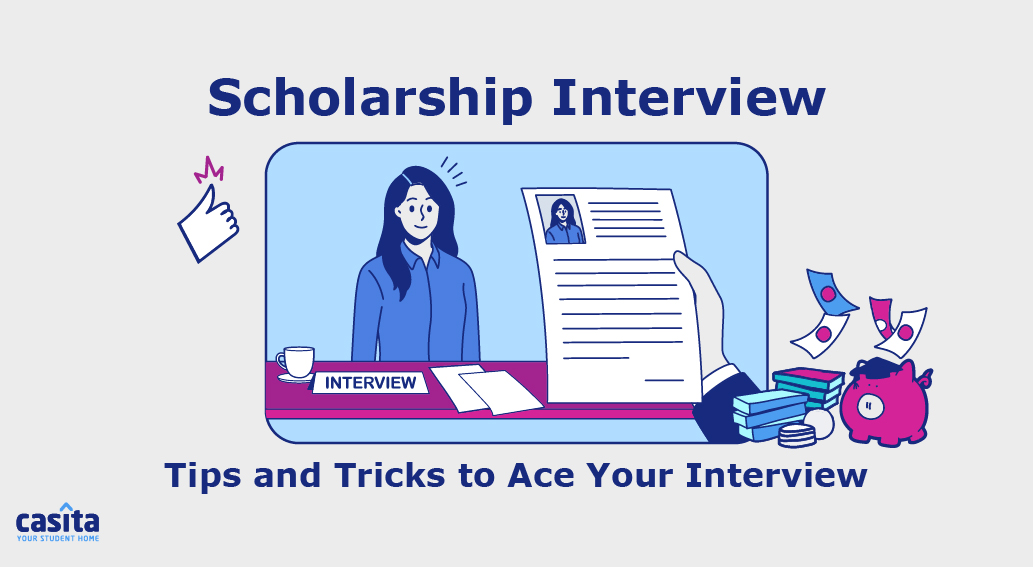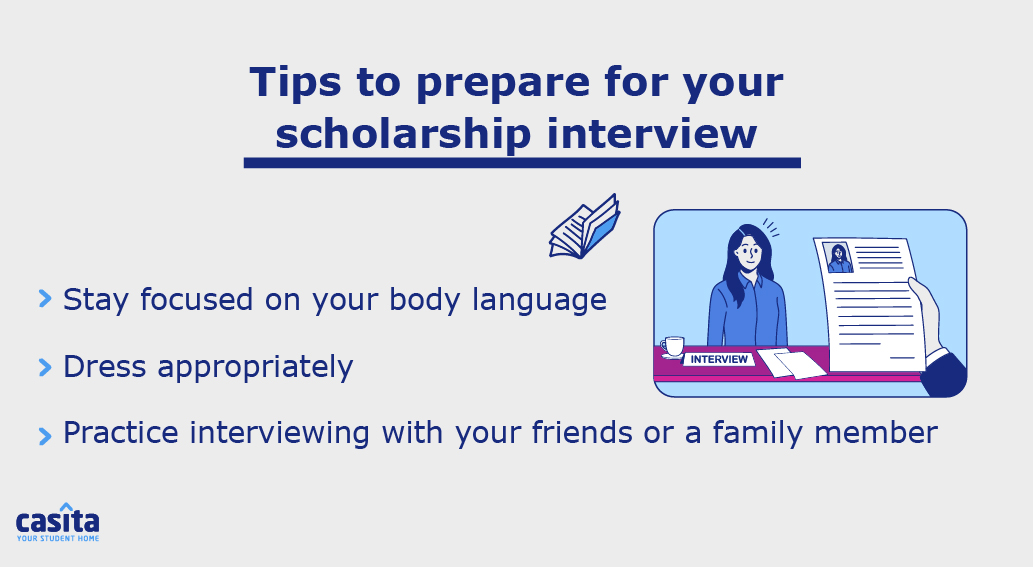Scholarship Interview: Tips and Tricks to Ace Your Interview
Tips and Advice
University Life
6 mins read
Share

Updated at: 25 November, 2025
Published at: 19 February, 2024
By Aiten Nadeem
Scholarship Interview: Tips and Tricks to Ace Your Interview
Tips and Advice
University Life
6 mins read

Updated at: 25 November, 2025
Published at: 19 February, 2024
By Aiten Nadeem
Share
Just like a job application, scholarship interviews follow the same pattern. After you apply to a university, submit your application, and provide the needed documents, you are expected to go through an interview. Some universities require a personal interview to get to know you better and understand why you are so eager to apply for their programme. It can last between 15 minutes and an hour, depending on the institution itself. However, most university interviews last 15–20 minutes. It can take place on the campus itself or online, as you’ll be interviewed by a small group of people, like a committee, and engage in a seamless conversation.
Rest assured that it’s such a smooth process; the key is to stay confident and calm. Think of this as an exercise or a trial when you land a serious job interview later on and have to be extremely professional. To ease your nerves, we have prepared a list of interview tips for students like yourself to help you study your desired field at your dream university!
Tips to prepare for your scholarship interview
Dress appropriately, neither too casual nor too formal. Keep it simple and neat
Practice interviewing with your friends or a family member. This will give you more confidence and take your mind off worrying too much about any curve ball thrown at you at the interview.
Go through your submitted applications and documents, and be ready for cross-questioning.
Stay focused on your body language and the way you’re presenting yourself. Avoid any anxious behaviours like chewing gum, biting your nails, yawing, slouching, and stretching. Always make eye contact with the committee members.
Read more about the university, its background, history, and system, as well as the programme you’re applying for.
If your interview is online, make sure you have a stable internet connection, a quiet environment, and a professional and clean background. To stay on the safe side, use headphones with a microphone, so you and the interviewer can hear each other more clearly.
Listen to the questions carefully. If you don’t understand any of the scholarship interview questions, then ask the interviewer to clarify them instead of going blank.
Be concise with your answers, and avoid long replies that deviate from the actual question that was asked in the first place.
Avoid any insensitive statements or topics related to politics, religion, racism, or ethnicity.
Be punctual, or even better, arrive a few minutes early, to avoid getting anxious.
Common Scholarship Interview Questions and How to Answer Them.
Like any interview or interaction with a stranger, you’re expected to break the ice first. The interviewer will ease you up by asking some personal questions to learn more about your persona and why you will be the right candidate for this scholarship.
Some of these questions include the following:
Tell us about yourself
This is the starter question for a scholarship interview, and although it may seem very easy, it’s also vital. Open-ended questions allow you to relax a little and talk more freely. It’s also best that you don’t assume that the interviewer knows everything about you and your academic background.
Take this question as an opportunity to impress the interviewer and highlight your qualifications and applicable skills. You can start answering this question by stating something general about yourself and then narrowing it down to your unique attributes. Stay confident while answering, maintain eye contact, and stay to the point.
Why do you deserve this Scholarship?
This is considered one of the open-ended questions as well. Think of this as a second chance for you to grab hold of the interview. The interviewer at this stage is trying to get to know you personally and whether your goals align with the institution and the programme you want to study.
We recommend that you focus while answering this question on your interest in the scholarship and the real reason behind applying to it. Depict your need for the scholarship and what makes you stand out from the rest. Try to prove that it has a much deeper meaning for you than it being a bid for another college fund.
What is your greatest strength or weakness?
This is a widely asked question in any interview. Take this question as an opportunity to showcase your great strengths and why you’re so fit for this scholarship. This question creates an image of your personality, morals, and character. It allows the interviewer to know if your personality matches within this academic institution. Remember to stay confident while answering, and when you talk about your weaknesses, mention how this scholarship will aid you in overcoming them.
What are your career goals?
At this stage of the interview, the questions start to get more professional and more focused on your career and courses. With this question, the interviewer seeks to know more about your future plans and whether you have an image of your career path or not. Make sure that your answer to this question aligns with the programme you’re applying for and the need for this scholarship.
Why did you choose this school?
One of our scholarship interview tips that we mentioned earlier is to research and have a strong background about the university you are applying to, as any interviewer will ask you this question. They want to know why, out of all the universities, you chose their programme specifically. Your response should highlight your passion for the university and the course you are applying to, as well as the unique attributes that you’ll gain from it. Convince the committee that you’re the right candidate for them and that you’ll be able to achieve your future career goals through their institution.
What are your hobbies and activities that you’re involved in?
This is one of the common interview questions, as the interviewer’s intention is to know you more personally and what your character is like outside of the academic perspective. Its main purpose is to know and determine whether you have some leadership traits, the ability to work with others, and the capability to take responsibility. Respond to this question by mentioning any extracurricular activities you’ve done during high school. However, try not to stick to that only, but also mention your contributions to society as a person and any work you’ve volunteered at.
Who is your role model?
This question aims to know what kind of person you want to be in the future and whether that aligns with your need for the scholarship. You can mention a family member, a CEO, or a historical figure; just ensure that you have done your research and learned their background beforehand. Keep in mind that the people you look up to the most say a lot about you as a person. Choose wisely.
Tell us about your greatest achievement.
The question gives you, as an interviewee, room to breathe and get back on the pace of talking about yourself a little more. Take this opportunity to brag about your greatest achievements and lay out all the types of accomplishments you have under your sleeves. We recommend that you prepare in advance for the types of achievements you’ll talk about, note everything down, and think it through. Moreover, explain the challenges you had to overcome that made this a special achievement for you.
Tell me about a situation where you took a stand against something you believed was wrong.
Situational-based questions are essential in any interview, as they demonstrate a lot about your personality and behaviour. The question is to understand how well you’ll do in stressful situations where your morals will be tested, and you have to stand firmly by whatever decision you’ll take. Mention a situation where you had to correct someone, like an elderly figure, and how you provided valuable feedback.
Is there anything you’d like to add?
When the interviewer asks this question, congratulations! You’ve reached the final line. This question holds a lot of weight, although it may seem simple. It’s a window of opportunity for you to engage in the conversation and discuss things that are of top priority to you, but you weren’t given enough time to discuss them. You can ask the interviewer questions related to the scholarship, like deadlines and what they look for in other candidates. Show that you’re eager and fight tooth and nail for this scholarship.
In a nutshell, we have laid out various interview skills for students, the most common questions, and the whole interview process. You can rest assured that you’ll ace that interview, and who knows, maybe you'll get that scholarship and start the most memorable experience of your life. Remember, the main key to the whole process is to stay confident and believe in yourself and your abilities.
Tips and Advice
University Life
By Aiten Nadeem
Share
Tips and Advice
University Life
Updated at:
Published at:
By Aiten Nadeem
Share

